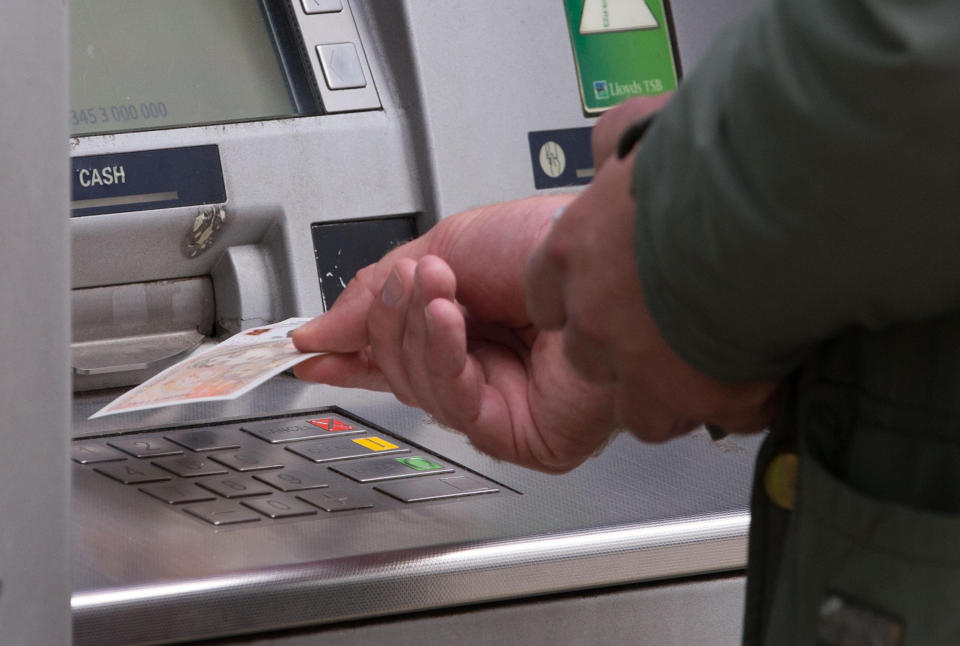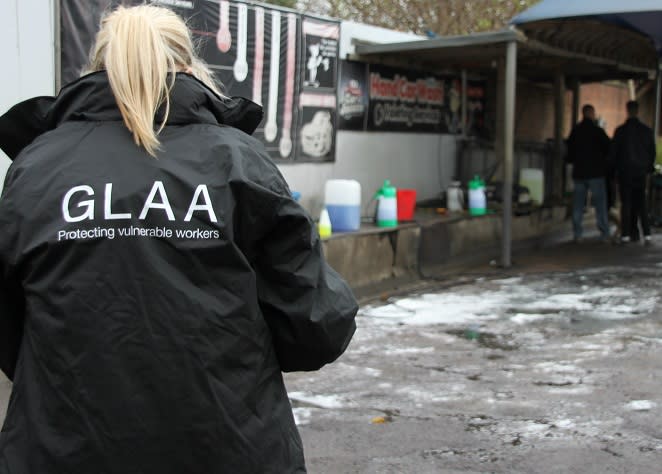UK banks told to do more to tackle modern slavery

UK banks must be more “vigilant” for modern slavery, after red flags were missed in the biggest modern slavery case ever uncovered in Britain.
A senior figure at the Gangmasters and Labour Abuse Authority (GLAA) told Yahoo Finance UK banks should ensure all frontline staff were trained to spot suspicious activity, and make sure reports were flagged to authorities.
“Frontline staff need to have that awareness,” said Frank Hanson, head of prevention and partnerships at the labour watchdog. “It’s similar to safeguarding — it’s the responsibility of everyone to be vigilant and act.”
More than 5,000 modern slavery offences were recorded by police in 2019, a 51% rise on the prior year put down largely to growing awareness and reporting.
READ MORE: Government ‘in the dark’ on the scale of exploitation in Britain
Business from supermarkets to fashion brands have faced criticism over exploitation in supply chains in recent years, but the role of the banking sector has faced less scrutiny.
Modern slavery can include financial exploitation on top of forced labour—controlling victims’ bank accounts to taking out loans in their names.
‘Missed opportunities’ for banks in modern slavery case
Hanson’s appeal for action comes after what he called “missed opportunities” for banks to have helped spot the biggest modern slavery network ever uncovered in the UK.
Police believe hundreds of Poles may have been exploited in Birmingham, with victims tempted by the offer of well-paid work and accommodation in Britain.
Victims were instead forced to live in vermin-infested homes sometimes without toilets or heating. They earned as little as £10 ($13) a week for long hours in farms, factories, warehouses and construction, according to a report by Britain’s independent anti-slavery commissioner earlier this year.
“Starving, beaten and fearful of threats to their families, many were relying on food banks and soup kitchens to survive,” it said.
WATCH: UK labour authorities on the scale of modern slavery in Britain
The gang made an estimated £2.46m through this exploitation, buying expensive cars with the proceeds.
Eight gang members were brought to justice after the ‘Operation Fort’ prosecution last year, but it came at least seven years after the gang’s activities had begun and opportunities to uncover them sooner appear to have been missed.
“There was a lot of suspicious activity at banks,” Emma Crates, prevention lead at the anti-slavery commissioner’s office, said at a GLAA webinar on exploitation last week.
Gang members accompanied victims to branches to open accounts, took out loans in their names, made false insurance claims and applied for benefits using their details. Financial information accounted for a third of all prosecutors’ evidence at trial.
“The wages sometimes aren’t the real value of financial exploitation,” said Hanson.
The commissioner’s report in June urged banks to take a more “proactive role” in branches and in reviewing data detecting modern slavery.
Suspicious activity includes the same person repeatedly using different cards to withdraw cash from multiple accounts on the same day, one individual interpreting for many others, and gang members quickly moving cash through accounts.
The report found seven different high street banks were used to hide their cash.

Hanson said high street banks, based in communities, needed to be both “aware and diligent,” as they may come into contact with both exploiters and victims.
“If something doesn’t look right, chances are it’s not. There’s cases where one person has taken 67 people in to open a bank account. That person turned out to be the trafficker.”
The case marked the UK’s biggest modern slavery prosecution, but Hanson was clear it was far from a one-off case of serious exploitation.
Reliable data on its scale is hard to come by, but Hanson said: “A phrase we’ve used is – the more we look the more we find.”
“It’s about the vulnerability of the workers,” he added. “It’s where there’s a demand for a low- or semi-skilled workforce of a temporary nature.”
Read more: Jobs tsar warns EU migration curbs ‘could fuel people smuggling’
Hotspots include not only agriculture and fresh produce, where the GLAA licences labour providers to regulate working conditions, but also construction, cleaning, nail bars, and restaurants, according to Hanson. Many workers in such industries are recent migrants in insecure jobs, often less aware of their legal rights and reliant on those who recruit them for work and accommodation.
Britain appears to have made some progress in recent years, with Theresa May making it a priority as home secretary and prime minister. New modern slavery legislation in 2015 meant UK authorities were “finding more cases generally as they’re looking through that lense,” Hanson said.
READ MORE: Boohoo searches for new auditor as PwC resigns in wake of scandal
A spokesperson for the UK Finance trade body said the industry “proactively monitors for indicators of modern slavery and human trafficking.”
The industry spends £5bn a year tackling economic crime, with modern slavery and human trafficking “an operational priority.” He also highlighted a new government and industry taskforce on money laundering launched in 2016.
OnePay, which handles wage payments for many temporary workers without UK bank accounts, is one of the financial firms to have trained all frontline staff.
Hanson said he welcomed the “increasing appetite” within finance to work with the authorities tackling the problem.
More information on how to report suspected human trafficking, forced labour or other exploitation is available on the GLAA website.

 Yahoo News
Yahoo News 